Sisters in Spirit: Iroquois Influence on Early Feminists
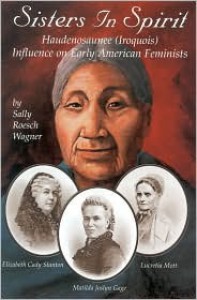 An odd little book - it's not all that well organized - but well-argued and researched with a great list of resources to add to my reading list. While Wagner digs deep to show the connection between Haudenosaunee governance and the rights sought by early suffragists, I do wish it went a little further in fairly examining the women it holds up as radical. The influence is there, yes, but many of them (including Anthony and Stanton) held indefensible views on race that are worthy of interrogation.
An odd little book - it's not all that well organized - but well-argued and researched with a great list of resources to add to my reading list. While Wagner digs deep to show the connection between Haudenosaunee governance and the rights sought by early suffragists, I do wish it went a little further in fairly examining the women it holds up as radical. The influence is there, yes, but many of them (including Anthony and Stanton) held indefensible views on race that are worthy of interrogation.
Being Mortal: Medicine and What Matters in the End
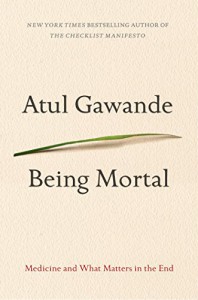 I received this book by coincidence in my Book Riot Quarterly box, but Gawande's article, "Letting Go," has stuck with me for years after reading it in the New Yorker. I'd recommend the whole book (the essay is included), but the article can be found here:
I received this book by coincidence in my Book Riot Quarterly box, but Gawande's article, "Letting Go," has stuck with me for years after reading it in the New Yorker. I'd recommend the whole book (the essay is included), but the article can be found here:http://www.newyorker.com/magazine/2010/08/02/letting-go-2
Euphoria
 2.5 stars
2.5 starsTo start with the positives, which are exceptionally well done: Lily King creates an intense, stifling, and deeply unsettling environment; the mud, the stench, the sweat, and the physical discomfort are visceral and suffocating. Much of her research is precise, and the anthropological details are fascinating. Her imagery is striking, and Nell/Mead is indeed an enigmatic presence.
Nevertheless, I was nagged by several issues. As a narrator, Bankson's a not-terribly-interesting outsider, even given his past tragedies and recent suicide attempt; they're simply a list of facts, sad things that happened at some point, but his emotional state isn't fully developed - he is largely concerned only with Nell. Fen is such a brutal, avaricious villain that there's no surprise in Nell's preference for the company and conversation of Bankson, who (unjealously) respects her mind and treats her kindly, so the love triangle didn't hold much tension.
Rather than letting the reader get to know Nell, her thoughts are filled in by her journal, which finds itself in Bankson's possession years later. It felt contrived, a way to fill in lots of information and Nell's plain thoughts, but only to an extent; she writes that she's in love with Bankson, erasing some needed tension, but she leaves out the part where she's being violently beaten by her brutish husband, a fact made clear to the reader long before it seems to dawn - too late - on Bankson.
The focus on anthropology, while fascinating, bothered me in places as well and contains perhaps my biggest quibble. We see how starkly out-of-place the three observers are - particularly Nell and Fen, with their crates upon crates of possessions - and how arrogantly biased, clearly reaching specious conclusions and projecting their own self-serving theories. While we're shown how little the anthropologists truly understand about the natives, however, I'm not sure the novel itself fares much better - they serve here only to better investigate the protagonists. They're scenery. None are real characters, which is most glaring with the almost completely unspeaking Xambun, who sets much of the last third of the book in motion. His death is key to the story, but, as a man and as a character, he's written as utterly expendable. We're told of the emotional cost to Nell and Bankson, but it doesn't resonate with a reader who has barely been acquainted with him The environment remains exotic and threatening, a backdrop to a larger story.
While I understand it's a personal preference and, to many readers, utterly beside the point...why bother with a meticulous focus on Margaret Mead's years in New Guinea, with characters so clearly based on the interactions of Mead with Reo Fortune, Gregory Bateson, and Ruth Benedict, when the ending was entirely fictionalized? King states elsewhere that she "had slipped out of the shackles of history, made a clean break with fact. And I set off into the jungle of my imagination," and that "A novel is where I want to feel the truth. Sometimes you need facts to get at the truth; more often you need your own voice and vision." I can respect that, but, to me, it didn't feel true - it felt like a twist of an ending that went for shock and Lifetime-movie tragedy at the expense of truth.
The Moor's Account: A Novel
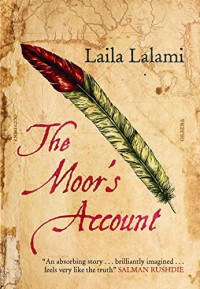 3.5 stars
3.5 starsSolid storytelling and a clever premise. A few of the characters fell flat for me, and it ends with something of a whimper, but it's well-paced, and the historical details she weaves into the story are fascinating.
The Residue Years
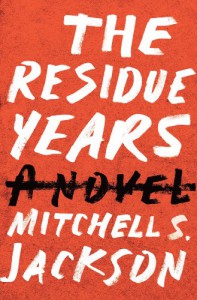 3.5 stars
3.5 starsI'm happy to see this book getting such a big push around Portland. "Portlandia" has a national image as a kooky, liberal utopia, and the fact that it's overwhelmingly white is often used as a punchline. That flippancy, though, ignores a long and violent past, and a history of displacement and racism that very much continues through the present day. Mitchell's novel serves as a forceful reminder of the Portland that's swept under the rug, the lives that have largely been ignored or exist only as headlines about gang violence and drug raids; he draws his characters with empathy and humanity, and the bond between Grace and Champ is beautifully rendered. We certainly see their flaws and the way they rationalize their poor choices (particularly Champ, whose fate initially seems less inevitable than Grace's), but the weight of their situation allows us to see that much of what happens is inescapable - there are no easy choices, and very little help along the way.
Still, as a novel, some things work, and others don't. Grace is a heartbreaking character, but, as a narrator, she is elusive; we never get into her head quite the way we get into Champ's. The narrative has fits and starts and is sometimes uneven. Nevertheless, Mitchell's a vibrant writer, and The Residue Years is poignant read, sparking needed conversation about gentrification, poverty, community, and who is granted visibility and humanity.
Wittgenstein Jr.
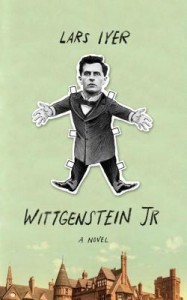 I loved this until about two-thirds of the way through, when it shifted away from being a clever and very funny satire to an oddly serious ramble with a tacked-on romance. And the italics, my god, the italics!
I loved this until about two-thirds of the way through, when it shifted away from being a clever and very funny satire to an oddly serious ramble with a tacked-on romance. And the italics, my god, the italics!
Why Love Hurts
 Not my usual cup of tea, but I picked this up for a small reading group. If your interest in the topic pertains strictly to heterosexual, upper-middle-class women, have at it. Otherwise, this talk about modern "love" might seem a little empty.
Not my usual cup of tea, but I picked this up for a small reading group. If your interest in the topic pertains strictly to heterosexual, upper-middle-class women, have at it. Otherwise, this talk about modern "love" might seem a little empty.
Dept. of Speculation
 Two stars for the first half, four stars for the second, so I'll go with three overall. I was deeply ambivalent about the first 50 pages or so but found the second half to be genuinely moving.
Two stars for the first half, four stars for the second, so I'll go with three overall. I was deeply ambivalent about the first 50 pages or so but found the second half to be genuinely moving.
Land of Love and Drowning: A Novel
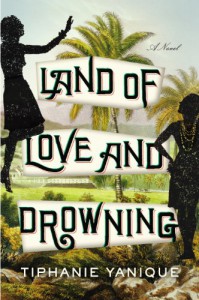 I liked this book far better than the three stars indicate...the setting is gorgeous, and I loved the elements of oral history and magical realism. Plot-wise, though, it's a bit of a mess, and I found myself progressively more annoyed with the author's habit of giving away major plot points in one sentence years and years (and pages and pages) before they actually occurred. That and , my goodness, so much incest.
I liked this book far better than the three stars indicate...the setting is gorgeous, and I loved the elements of oral history and magical realism. Plot-wise, though, it's a bit of a mess, and I found myself progressively more annoyed with the author's habit of giving away major plot points in one sentence years and years (and pages and pages) before they actually occurred. That and , my goodness, so much incest.
Pages from the Goncourt Journals (New York Review Books Classics)
 I'm reading through a selection of Geoff Dyer's essays and ran into this one on the Goncourts:
I'm reading through a selection of Geoff Dyer's essays and ran into this one on the Goncourts:http://www.theguardian.com/books/2006/dec/09/featuresreviews.guardianreview27
It does express well what makes a collection thatg should be insufferable so compelling. I wouldn't want to hang out with the brothers Goncourt, but reading from the outside is great fun.
Never Have I Ever
 This book was included in one of my Book Riot mailings. It's the drivel-iest drivel I've read in a long time - vapid, self-absorbed, and just plain silly. How did something this immature get published? It was enough to make me want to cancel my subscription on the spot.
This book was included in one of my Book Riot mailings. It's the drivel-iest drivel I've read in a long time - vapid, self-absorbed, and just plain silly. How did something this immature get published? It was enough to make me want to cancel my subscription on the spot.
We Should Never Meet: Stories
 A solid 3.5 stars. Some of the stories were quite strong, while others never really went anywhere. Phan is a skillful writer, deftly tying her stories together without resorting to gimmick.
A solid 3.5 stars. Some of the stories were quite strong, while others never really went anywhere. Phan is a skillful writer, deftly tying her stories together without resorting to gimmick.
The Half-Finished Heaven: The Best Poems of Tomas Transtromer
 A gorgeous book. I'd love a different translation, though - a few lines words here and there seemed clunky, or just slightly off. Really lovely, quiet imagery
A gorgeous book. I'd love a different translation, though - a few lines words here and there seemed clunky, or just slightly off. Really lovely, quiet imagery
What We See When We Read
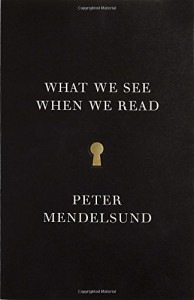 Visually beautiful, but it did become a bit tiresome. Seemed more gimmicky than insightful at times.
Visually beautiful, but it did become a bit tiresome. Seemed more gimmicky than insightful at times.








